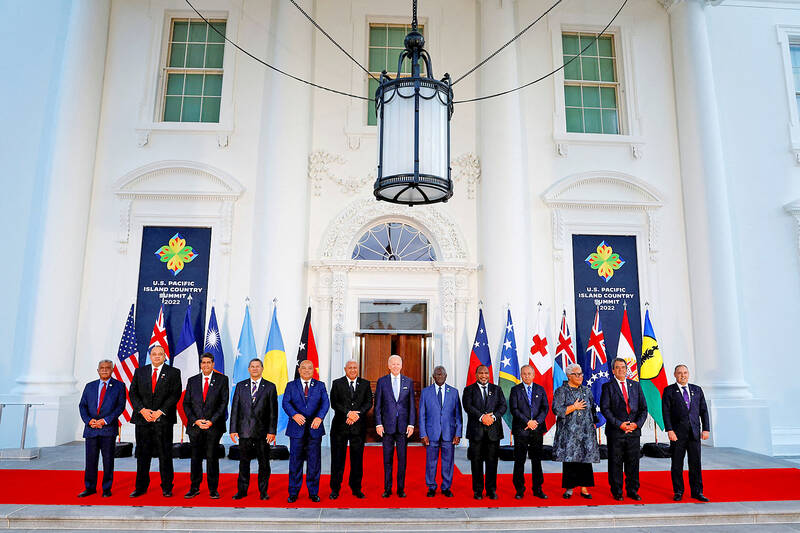China’s aid to the South Pacific is increasingly targeted toward its political allies as appetite for Chinese credit falls and competition grows with the US for influence, an independent Australian think tank reported yesterday.
China’s overall economic influence among the 14 aid-dependent island nations in the region is losing ground because of better loan deals being offered by US allies, especially Australia, the Sydney-based Lowy Institute said in its annual analysis of aid to the region.
Focus on the strategic competition in the South Pacific has heightened since China struck a security pact with the Solomon Islands last year that raised the prospect of a Chinese naval foothold in the region.

Photo: Reuters
China has increased aid to the Solomons and Kiribati since they switched diplomatic allegiances to China from Taiwan in 2019, the report said.
The US has sought to counter Chinese influence in the region with additional diplomatic and economic engagement. US President Joe Biden recently hosted Pacific Island leaders at the White House.
China’s overall aid to the island states in 2021 — the latest year for which the international policy think tank has comprehensive data — was US$241 million.
The year continued a downward trend in Chinese grants and loans to some of the world’s most aid-dependent countries since China’s US$384 million peak in 2016, the institute reported.
The latest report revises previous Chinese annual contributions based on additional data, but maintains the downward trend.
“It reflects a strategic shift to reduce risk, cement political ties and enhance capital returns,” the report said.
China’s US$3.9 billion aid to the Pacific since 2008 was primarily directed to countries with which it has diplomatic ties, including Cook Islands, Fiji, Micronesia, Niue, Papua New Guinea and Samoa.
“Because China only provides ODF [official development finance] to a subset of Pacific countries, it can play an outsized role in these countries that belies its moderate role share of total regional financing,” the report said.
China was the third-biggest aid contributor to Pacific after Australia, which provides 40 percent, then the Asian Development Bank, the report said.
The fall in Chinese aid has been driven mainly by a lack of Pacific government interest in Chinese loans that have left Pacific states, including Tonga, heavily in debt.
The US has warned that Chinese finance is a debt trap for poor countries that threatens their sovereignty.
“What is very clear is that the interest from Pacific governments in Chinese loans, specifically infrastructure loans, has declined,” Lowry researcher Riley Duke said. “It’s just being outcompeted.”
China held a third share of the infrastructure investment in the Pacific market two decades ago, but that proportion had since halved, the report said.

STILL COMMITTED: The US opposes any forced change to the ‘status quo’ in the Strait, but also does not seek conflict, US Secretary of State Marco Rubio said US President Donald Trump’s administration released US$5.3 billion in previously frozen foreign aid, including US$870 million in security exemptions for programs in Taiwan, a list of exemptions reviewed by Reuters showed. Trump ordered a 90-day pause on foreign aid shortly after taking office on Jan. 20, halting funding for everything from programs that fight starvation and deadly diseases to providing shelters for millions of displaced people across the globe. US Secretary of State Marco Rubio, who has said that all foreign assistance must align with Trump’s “America First” priorities, issued waivers late last month on military aid to Israel and Egypt, the

France’s nuclear-powered aircraft carrier and accompanying warships were in the Philippines yesterday after holding combat drills with Philippine forces in the disputed South China Sea in a show of firepower that would likely antagonize China. The Charles de Gaulle on Friday docked at Subic Bay, a former US naval base northwest of Manila, for a break after more than two months of deployment in the Indo-Pacific region. The French carrier engaged with security allies for contingency readiness and to promote regional security, including with Philippine forces, navy ships and fighter jets. They held anti-submarine warfare drills and aerial combat training on Friday in

COMBAT READINESS: The military is reviewing weaponry, personnel resources, and mobilization and recovery forces to adjust defense strategies, the defense minister said The military has released a photograph of Minister of National Defense Wellington Koo (顧立雄) appearing to sit beside a US general during the annual Han Kuang military exercises on Friday last week in a historic first. In the photo, Koo, who was presiding over the drills with high-level officers, appears to be sitting next to US Marine Corps Major General Jay Bargeron, the director of strategic planning and policy of the US Indo-Pacific Command, although only Bargeron’s name tag is visible in the seat as “J5 Maj General.” It is the first time the military has released a photo of an active

CHANGE OF MIND: The Chinese crew at first showed a willingness to cooperate, but later regretted that when the ship arrived at the port and refused to enter Togolese Republic-registered Chinese freighter Hong Tai (宏泰號) and its crew have been detained on suspicion of deliberately damaging a submarine cable connecting Taiwan proper and Penghu County, the Coast Guard Administration said in a statement yesterday. The case would be subject to a “national security-level investigation” by the Tainan District Prosecutors’ Office, it added. The administration said that it had been monitoring the ship since 7:10pm on Saturday when it appeared to be loitering in waters about 6 nautical miles (11km) northwest of Tainan’s Chiang Chun Fishing Port, adding that the ship’s location was about 0.5 nautical miles north of the No.